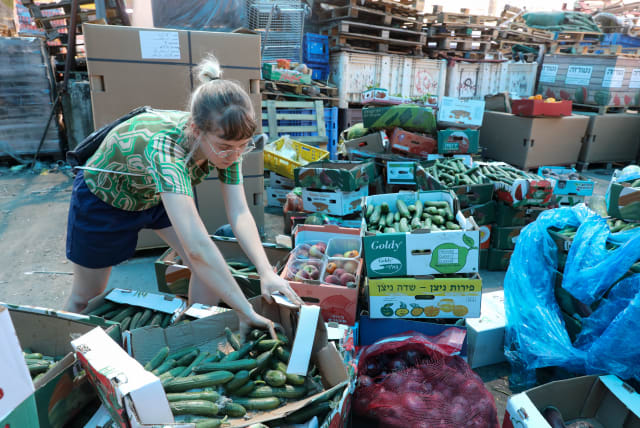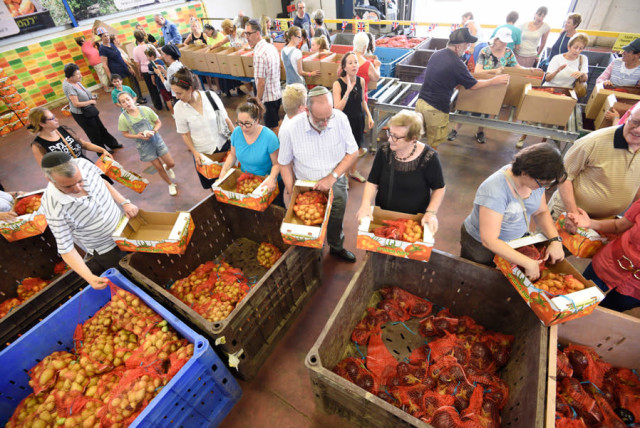Israel wasted 2.6 million tons of food in 2022, 5% of healthcare budget spent on food insecurity

The war's impact, coupled with displacement and economic strain, is expected to further strain vulnerable populations.
A recent Food Waste and Rescue Report, jointly published by Leket Israel, the Environmental Protection Ministry, and the Health Ministry, reveals the intricate challenges posed by food insecurity and wastage in the Israeli context. Authored by BDO, the report sheds light on the economic implications of excess healthcare expenditures, rising food loss, and the anticipated increase in prices due to the ongoing war in Gaza.
In 2022, excess healthcare costs, attributed to food insecurity, reached NIS 5.2 billion ($1.5b.), representing around 5% of the total national health expenditures. The war’s impact, coupled with displacement and economic strain, is expected to further strain vulnerable populations, with 1.4 million individuals already living in nutritional insecurity.
The report discloses that in 2022, 2.6m. tons of food were lost, valued at NIS 23.1b. ($6.5b.) annually. Conflict zones, constituting 30% of agricultural areas, are anticipated to escalate food loss due to labor shortages and restricted access to fields and orchards. The report advocates for immediate measures to rescue and distribute surplus food, particularly during times of crisis.
Gidi Kroch, CEO of Leket Israel, underscored the seriousness of the situation. “The current situation, the largest crisis Israel has ever faced, further emphasizes the importance of independent food security for all the country’s citizens, and for disadvantaged populations in particular. Today, more than ever, we do not have the privilege of wasting good, high-quality, nutritious, and healthy food,” he said.
Food rescue infrastructure
Kroch urged the government the formulate a comprehensive plan and budget to establish infrastructure for food rescue, potentially saving over NIS 13b. ($3.7b.) in the national budget for healthcare, environmental, and welfare expenses. “When we do that, we will, as a country, take a big step forward,” he said.
The Environmental Protection Ministry collaborates with Leket Israel to redirect surplus food to security forces, displaced populations, and those in need during crises. CEO Guy Samet emphasized the importance of this, stating, “Preventing food waste and rescuing it instead will strengthen Israel’s resilience in routine and emergencies.”
Ronit Andwalt, Director of the Nutrition Division at the Health Ministry, highlighted the connection between food insecurity and health conditions, estimating projected healthcare costs associated with treating diseases linked to food insecurity.
“Food insecurity in Israel is a phenomenon that is increasingly prevalent in recent years, and unfortunately, we expect it to rise even more in 2024,” Andwalt said. “Food insecurity is often accompanied by choices of cheaper food, which generally include smaller quantities of essential food groups for a healthy diet: vegetables, fruit, whole grains, and proteins. As a result, food insecurity poses a risk factor for various health conditions, both in adults and especially in children. Obesity and related illnesses are more common among those experiencing food insecurity, impacting their ability to function, academic success, and social leadership.”
Additionally, treating diseases such as type 2 diabetes, high blood pressure, heart diseases, etc., incurs significant economic costs for the healthcare system,” Andwalt continued. “Rescuing healthy food and providing it to vulnerable populations can be a key factor in reducing the phenomenon and, in turn, reducing associated illnesses and healthcare system costs.”Chen Herzog, Chief Economist of BDO and editor of the Food Waste and Rescue Report stressed the need for a national policy on food rescue. “This war highlights the importance of food security during routine times and in emergencies,” he said, reiterating the report’s figures on food waste and health costs. “This is in addition to almost NIS 4b. ($1.1b.) in environmental damage. The war is increasing these costs.”As the war continues to impact agricultural areas and escalate food insecurity, the report calls for comprehensive measures to strengthen economic resilience, reduce food waste, and implement a national strategy for food rescue to address the complex challenges faced by Israel.
Jerusalem Post Store
`; document.getElementById("linkPremium").innerHTML = cont; var divWithLink = document.getElementById("premium-link"); if (divWithLink !== null && divWithLink !== 'undefined') { divWithLink.style.border = "solid 1px #cb0f3e"; divWithLink.style.textAlign = "center"; divWithLink.style.marginBottom = "15px"; divWithLink.style.marginTop = "15px"; divWithLink.style.width = "100%"; divWithLink.style.backgroundColor = "#122952"; divWithLink.style.color = "#ffffff"; divWithLink.style.lineHeight = "1.5"; } } (function (v, i) { });

